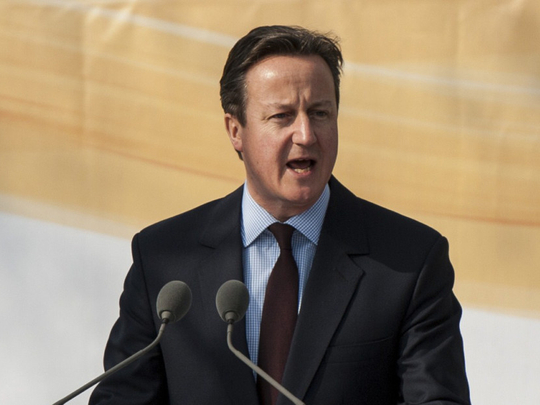
It does not take long for a Scot visiting London at this election time to be met by a profound air of resignation from the natives, followed by a distinctly weary: “Oh God, not you lot again.”
Politics for the whole of 2014 was dominated by the question of Scottish independence and whether or not the 300-year Act of Union should be revoked and the United Kingdom broken up. But those who thought the British had got rid of the issue on September 18 when the Scots voted, by an 11 per cent margin, not to walk away, have been rudely disappointed.
The “Scottish question” never went away north of the border, but it is an unpleasant surprise to everyone in the rest of Britain that it is now dominating the 2015 political agenda too. How could this have happened? First and foremost there was Nicola Sturgeon, the Scottish National Party (SNP) leader, and Alex Salmond, her predecessor, saying that they would use the expected extra Commons seats they were looking for on May 7 to back a Labour government and pursue so-called “progressive policies”.
Then stories even began to appear, perhaps half-jokingly — and probably emanating not a million miles from the man himself — that Alex Salmond may be the deputy prime minister in a coalition government. Subsequent Labour mutterings that Ed Miliband should declare that he would have nothing to do with the SNP went nowhere because Miliband wants to keep his options open, only for Sir John Major to lob a mortar into proceedings through the columns of the Daily Telegraph just more than a week ago with a powerful denunciation of Miliband’s equivocation.
The issue hotted up spectacularly last week with a vicious Tory election poster depicting a tiny Miliband in a giant Salmond’s pocket and with Prime Minister David Cameron accusing the Labour leader’s decision not to distance himself from the Nats as “weak and despicable”.
The reality is that both Cameron and Miliband are gambling desperately and dangerously over The Scottish Question. Miliband’s quandary is an extremely serious one. If he does a “confidence and supply” deal with the Nats so that he can form a government, even if the Tories were the biggest party, he would stand accused of perpetrating a negation of democracy and one for which the party risks paying heavily in the future. And how, in all conscience, could a British prime minister sup with a party whose sole aim is the abolition of Britain?
In his case, Cameron knows that Scotland is likely to be a graveyard for Labour — possibly significant enough to make the difference between him staying in Downing Street or sending for the removal van. All 41 seats currently held by Labour are under threat, with some of the wilder predictions suggesting that the Nats could win 50-odd of Scotland’s total of 59. And from the tenor of their remarks that is precisely what senior Tories, led by the prime minister, are happy to see happen. They are content that their ancient enemy, or at least that part of it north of the border, be wiped out by the SNP.
It is an incredible position for a declared Unionist, such as Cameron, to find himself in. A hammering for Labour may keep him in No 10, but he should be careful for what he wishes. His view is certainly not shared by all Tories in Scotland. The party may have only one MP, but it clocked more than 400,000 votes in 2010 and they formed the bedrock of those who voted No in the referendum. So while the prime minister issued stirring “Vote Tory” calls at the party’s Edinburgh conference three weeks ago, many Tory activists in the hall were planning, even with Cameron’s words still ringing in their ears, to vote tactically against the SNP. For most that would mean not voting for their own party.
Grassroots Unionist organisations, made up primarily, but not exclusively, of traditional Tory supporters, have sprung up in several parts of Scotland and there is no doubting their determination to defy their leaders nor their belief that a Labour victory nationally in the UK is preferable to a rampant SNP plunging Scotland into yet another referendum battle.
They plan to issue constituency voting guides and there is a slim chance some Tory candidates may benefit, as well as some Liberal Democrats. Danny Alexander, the Lib Dem Chief Secretary to the Treasury and a member of the Coalition’s ruling “Quad”, is openly appealing for traditional Tory and Labour voters to help him save his Inverness, Nairn, Badenoch and Strathspey constituencies in the face of a determined SNP attack.
Yet, the main message to traditional Tories, as well as to those remaining Lib Dems in Scotland, will be: Hold your noses and vote Labour. Tory high command is furious that such tactical voting is being planned. Labour’s bosses, meanwhile, are pretending they do not need it. But they are fooling no one and in constituencies all over Scotland, on street corners, in pubs and clubs and in door-to-door canvassing, Labour MPs are privately wooing — and being wooed by — their one-time Tory enemies.
Beating the Nats is the common purpose. Cameron may want to obliterate the Scottish Labour Party, but many of his party’s long-time supporters have a different target in their sights. Together with Labour, covertly or overtly, they want to attack and dent the hated SNP.
— The Telegraph Group Limited, London, 2015








